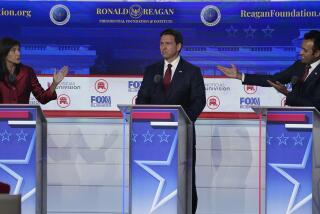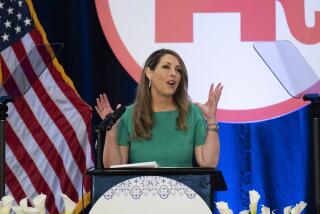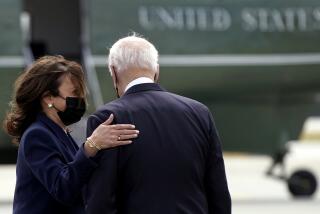Column:: The first Democratic debate won’t break ratings records. And that’s OK
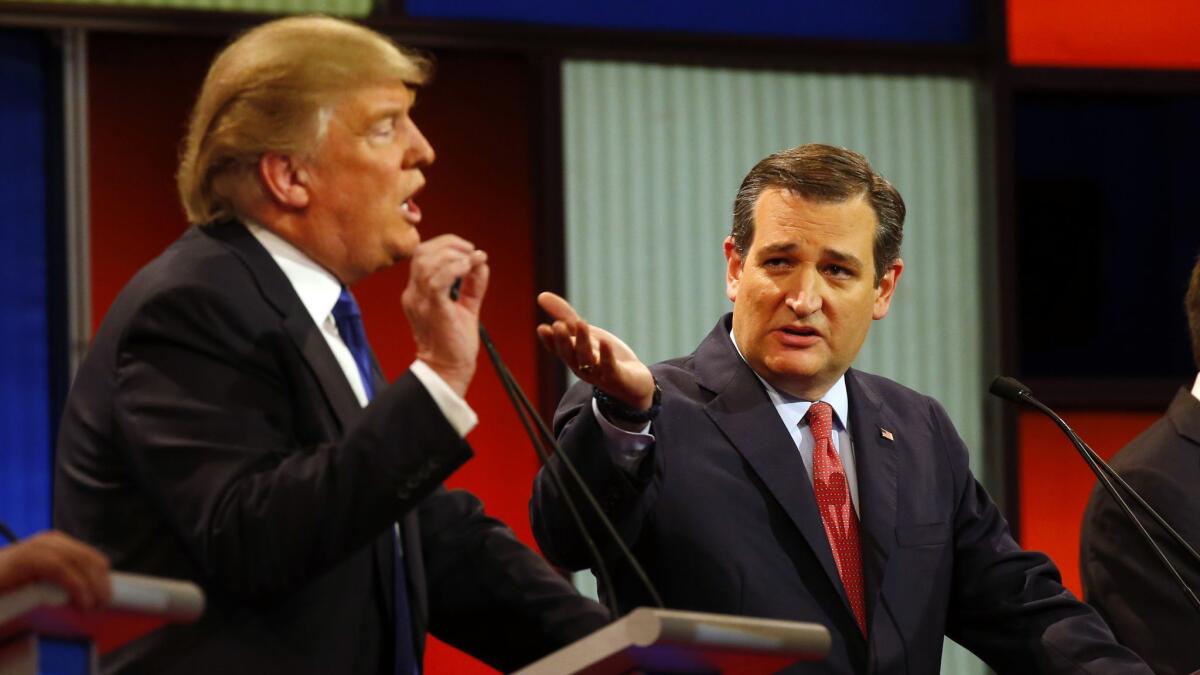
It’s safe to say that no one will call anyone a “moron” or a “pathological liar” at the first Democratic debates. No one will insult anyone’s parents or use derogatory nicknames. No one will threaten to start World War III. And no one, I mean no one, will be making semi-veiled comments about the size of their own or anyone else’s genitals.
Also, the president will be tweeting triumphantly about the debate’s low ratings.
Which is something I think we can all live with.
Twenty presidential hopefuls will take the stage, in two shifts of 10, at the Adrienne Arsht Center for the Performing Arts of Miami-Dade County on Tuesday and Wednesday. Though the number is higher than the parade of 16 ties and one red power suit that made up the first set of GOP debates four years ago, the rubbernecking factor is far lower.
About those ties — of the 23 leading Democratic candidates (three of whom didn’t qualify for the debates), an unprecedented six contenders are women (who, I will be quick to add, are certainly free to wear ties if they so choose). There are also six people of color in the running and one gay man, making this the most diverse group of presidential hopefuls in our country’s history. It’s also the youngest — 10 of the candidates are under 50.
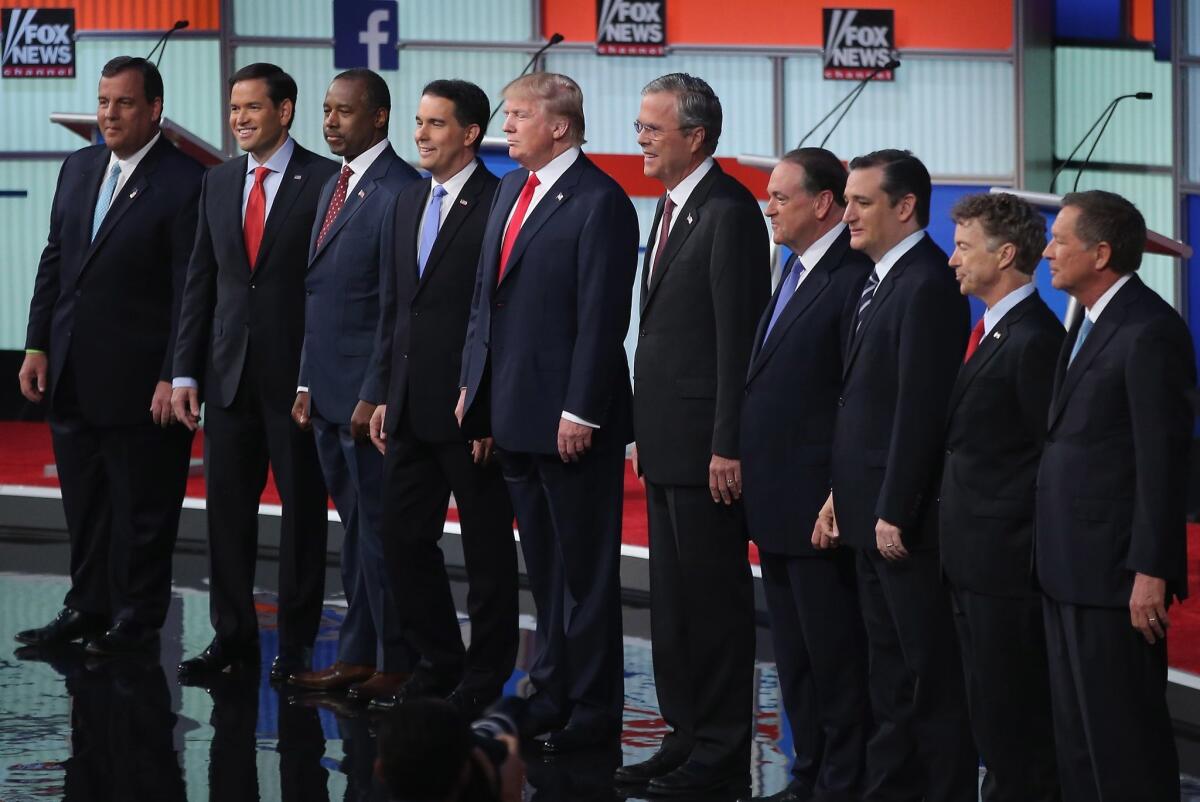
If they were starring in a superhero movie, such progress might prove to be a viewer magnet. And though star congressional freshman Alexandria Ocasio-Cortez won’t be on the debate stage — at 29, she’s too young to run for president — self-help guru Marianne Williamson will be; millions may tune in just to hear how, exactly, she plans on prompting a spiritual and moral awakening in our divided nation.
Things will no doubt get testy. Front-runner Joe Biden will have to answer for his sudden denunciation of the long-standing Hyde Amendment, which bars federal healthcare funds from being used for abortions, and he and Cory Booker could get into it over Biden’s refusal to apologize for waxing nostalgic about the political “civility” that allowed him to work in the past with segregationists despite his loathing of their position. Bernie Sanders may be confronted about his “bros;” Elizabeth Warren could be asked, once again, about her past claims to Native American ancestry and will be pressed on how she’s going to pay for all the free stuff she keeps promising. And it will be interesting to see, given the number of women present, how gender-specific topics such as abortion and pay equity, not to mention the interruption issue, play out.
It’s unlikely, though, that the Democrats will beat the 2016 GOP’s first-debate record of 24 million viewers because, as he will no doubt point out, Donald Trump will not be present. Which means no cage match.
Sure, sharp words have flown already, aimed mainly at Biden, who after all these years has lots of baggage and is the safest target. Likewise, many former Hillary Clinton supporters are not thrilled that Bernie Sanders is back; the “Bernie bros” got hammered as sexist during the 2016 campaign and blamed for Clinton’s defeat after. And certainly there is a big gap between what the more mainstream candidates envision for the country and what the progressives want.
But it’s the Democrats, who are, historically, not big fans of intra-party vitriol, whose collective tolerance for diverse opinions has often defined them (and more than occasionally defeated them).
Despite the large number of candidates, it takes considerable effort to imagine any of the Democratic debates going cage-match, even if the networks attempt to encourage it by creating a smack-down atmosphere.
Faced with a then-unprecedented number of participants and the numbers-bumping public fascination with Trump, the GOP debates quickly jettisoned the traditional format of long statements followed by rebuttals. Instead, moderators leveraged an already acrimonious campaign by spending much of the time having candidates address their opponents’ criticisms, which resulted in confrontations and a combative tone that seemed tailor-made for Trump.
Who took the ball and ran with it all the way to the White House.
But not before the networks lost themselves in celebration of ratings such as they had never seen before.
Never mind that they, and virtually all their moderators, were increasingly trashed for not just allowing but encouraging and facilitating verbal skirmishes that passed for political debate.
With a few notable exceptions — Megyn Kelly, Lester Holt — moderators were treated as cannon fodder, tasked with controlling a situation that no one beyond a few prune-faced critics and columnists really wanted controlled because look at the numbers! Have you ever seen such numbers?!? Who cares what he’s saying — someone will fact-check it later. Who cares about statesmanship or even equal air time — more than twice as many people are watching than ever before! They love it!
Well, some of them did genuinely love it, while some were watching like sports fans waiting for the ref’s whistle that never came and some with the kind of horrified rapture traditionally reserved for wildfires and hurricanes and other national disasters.
But it was definitely something different, and few could call it boring. By the end, almost every Republican candidate left standing had surrendered to personal invective, and it was difficult not to feel that something had been unmasked — the petty machismo/red-meat fury, the spluttering hypocrisy, the greasy deal-making.
Our political fiction, and historical nonfiction, often reveals the grudge-holding, obscenity-laden, truth-molding nature of politics, but rarely had we seen it with such shocking clarity in real-time campaigning.
After the dignified, and according to some false, calm of the Obama administration, Trump grabbed the spotlight as disruptor-in-chief and many, though not most, American voters were grateful.
Now, however, we have had three-plus years of nonstop disruption, and for many dignified calm is looking good — the fact that Biden is the current front-runner attests to that. Biden may be many things but he is never mean; the harshest word he uses is “malarkey.”
Which is not to say the Democratic candidates are boring. Given their diversity in demographics and political outlooks, they should provide a lively if crowded debate.
With 10 candidates of any sort, moderators will have to work hard to make sure everyone gets a turn, and the Democrats have already said that those moderators will always include a woman and a person of color, which should add its own new dynamic (here’s hoping the women are not expected to ask the “women-related” questions and so on).
The sheer number ensures that the candidates will have to come on strong to be heard, to differentiate themselves from the crowd and, more important, to establish themselves as the best choice to take on the president.
So while no one expects, or wants, another series of cage matches, too much polite deference will not be helpful to anyone. The clock is ticking on too many issues — climate change, immigration, abortion rights, gun control, the chasm between rich and poor.
But there is a difference between strength and acrimony, and if the Democratic debates create a candidate that can prove one without stooping to the other, then that will be some pretty great television too.
More to Read
The biggest entertainment stories
Get our big stories about Hollywood, film, television, music, arts, culture and more right in your inbox as soon as they publish.
You may occasionally receive promotional content from the Los Angeles Times.
